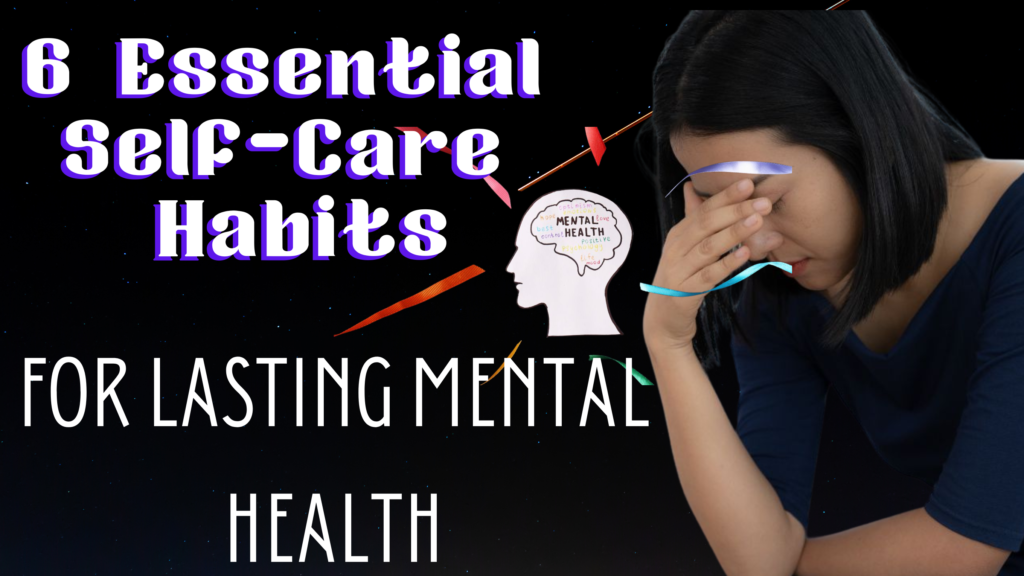6 Powerful Self-Care Habits to Transform Your Mental Health for the Long-Term
Accomplishing and keeping up long-term mental wellbeing isn’t almost about looking for treatment or medicine. It’s approximately consolidating basic self-care propensities into your day by day schedule. These propensities not as it were support your intellect but too construct strength and cultivate a positive viewpoint on life. Let’s investigate six effective self-care propensities that are fundamental for supporting mental well-being.
1. Prioritize Quality Sleep for Mental Health
Rest is the establishment of great mental wellbeing. It’s amid profound rest that your brain forms feelings and recollections, which is basic for mental wellbeing. Ponders uncover that destitute rest designs can lead to increased stretch, uneasiness, and sadness. To prioritize rest:
- Stay on a consistent sleep schedule.
- Create a calming bedtime routine, like reading or meditating.
- No screens for an hour before bed.
- Make sure your sleep environment is quiet, dark, and comfortable.
If you make quality sleep a non-negotiable part of your routine, the benefits will be greater for you in the long run.”
2. Exercise Regularly to Boost Mental Wellness
Exercise is another way known to improve mental health. Physical activity releases endorphins, chemicals resulting in better moods regularly and lessened stress. Exercise also is a group of treatments in itself designed to minimize anxiety and depression. To benefit from it:
- Choose a form of exercise you enjoy: dancing, hiking, swimming, etc.
- Set reachable fitness goals to try and be motivated.
- Walk for at least 10 minutes during your day.
Exercise regularly and feel the radical changes happen in your mental health.

3. Practice Mindfulness and Meditation
Mindfulness and meditation are important steps in mental health maintenance. These methods keep you aware of the present, reducing stress and contributing to clarity. Mindfulness exercises-such as deep breathing or meditation-will improve your control over negative thoughts and feelings. To incorporate mindfulness into your daily activities:
- Make a 5-minute meditation a start to your day.
- Focus on breathing during stressful moments.
- Use guided mindfulness apps for structured practice.
Once you get a habitual pattern of mindfulness in your day, the positive mental health impact will be immeasurable.
4. Maintain Healthy Relationships
Connections are gradually forming a circle, an intrinsic network that ultimately lends more fortitude against stress-related problems. Otherwise, it may be seen as detrimental to both mental and physical health owing to the isolation and loneliness pressing upon you and out of which you forge relationships providing an emotional safety net against stressors. Build healthy relationships by following measures to attain them:
- Spend time with your loved ones, even if it is virtual.
- Practice active listening and empathy in conversations.
- Set healthy boundaries with people to protect your mental space.
When you start valuing your relations, you activate the support network that is necessary to cushion your reverse resilience.
5. Nourish Your Body with Healthy Nutrition

Food has direct effects on mental health. A diet rich in nutrients means better brain function, higher moods, and less stress. Self-care techniques for mental health include:
- Whole foods, i.e., fruits, vegetables, lean proteins, and whole grains.
- Avoiding sugar and processed foods.
- Keeping hydrated.
The balance of diet is an important factor for keeping up physical health, thereby paving the way for the preservation of good mental health over the long term.
6. Set Boundaries and Prioritize Self-Care Activities
Taking on too many obligations and failing to take care of oneself manifest into burnout lengthening into mental health issues. Learning boundaries ensures that you take time to recharge. Some tips to consider are:
- Declining tasks that threaten to overwhelm you.
- Dedicate time to hobbies or activities that bring you joy.
- Disconnecting from technology in order to focus on yourself.
Prioritization of self-care activities is meant to give you a better chance to keep a healthy mind without becoming emotionally exhausted.

Conclusion
These six critical self-care skills are simple habits to adopt to achieve long-term mental health. By prioritizing sleep, exercise, mindfulness, healthy relationships, nourishing your body, and setting boundaries, you provide firm grounding for mental resilience and happiness. Take baby steps and be consistent, and you will see habits grow in you.
